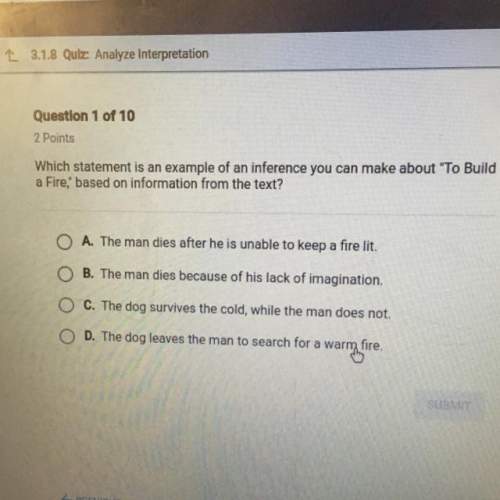
English, 16.08.2020 01:01 sindy35111
Based on the following passage, which two examples are forms of social identification? Someone who is a member of a larger group may begin to think or feel like other people in that group. This influence is known as social identification. Social identification is the process of defining oneself by characteristics shared with other people (Deaux).
A. a farmer marching with other farmers to support amending an agricultural law
B. a math professor who sees himself as a loud and funny person
C. a woman who joins a women’s group to campaign for equal rights
D. a scientist who sees herself as someone who loves her job

Answers: 3


Another question on English

English, 21.06.2019 20:10
Read this excerpt from "we shall overcome." hundreds of thousands of people sang them. but sometimes, it was one lone person with a guitar. they sang in segregated bus stations, picket lines, freedom marches, concert stadiums, city squares, and videos. when injustice of oppression threatens, people sing protest songs to proclaim their resistance, publicize their cause, and encourage hope for a better future, based on this excerpt as an introductory paragraph, which of the following would you expect to read about in the article? different groups of people who were oppressed the ways that music brings diverse groups of people together similarities between historical movements that provided rights for groups of people different song styles throughout specific historical events
Answers: 3

English, 21.06.2019 23:30
In at least 150 words, discuss the comparison described in the figurative language and how the connotative language reinforces the symbol. be sure to include a definition if your terms
Answers: 3

English, 21.06.2019 23:30
4. at the conclusion of frankenstein, robert walton has an encounter with the monster, who arrives after victor frankenstein has died. perhaps surprisingly, the monster mourns his creator and expresses remorse over the fate that victor suffered. the monster pledges to destroy himself and then departs, disappearing as he goes further north. how does the monster’s behavior and attitude in this part of the novel affect the way readers view him? is he sympathetic? is he more hateful because it is only after victor has died that he relents? how does the change in the monster fit with the theme of duality in the novel?
Answers: 1

English, 22.06.2019 03:40
Read this paragraph from chapter 5 of the prince. there are, for example, the spartans and the romans. the spartans held athens and thebes, establishing there an oligarchy: nevertheless they lost them. the romans, in order to hold capua, carthage, and numantia, dismantled them, and did not lose them. they wished to hold greece as the spartans held it, making it free and permitting its laws, and did not succeed. so to hold it they were compelled to dismantle many cities in the country, for in truth there is no safe way to retain them otherwise than by ruining them. and he who becomes master of a city accustomed to freedom and does not destroy it, may expect to be destroyed by it, for in rebellion it has always the watchword of liberty and its ancient privileges as a rallying point, which neither time nor benefits will ever cause it to forget. and whatever you may do or provide against, they never forget that name or their privileges unless they are disunited or dispersed, but at every chance they immediately rally to them, as pisa after the hundred years she had been held in bondage by the florentines. what idea is stressed in the passage? the desire for liberty the establishment of an oligarchy the dismantling of an acquired state the tendency toward rebellion
Answers: 3
You know the right answer?
Based on the following passage, which two examples are forms of social identification? Someone who i...
Questions










Mathematics, 22.09.2019 03:20

Social Studies, 22.09.2019 03:20

History, 22.09.2019 03:20





Mathematics, 22.09.2019 03:20


Mathematics, 22.09.2019 03:20




